The countdown to the ninth-generation Toyota HiLux is on.
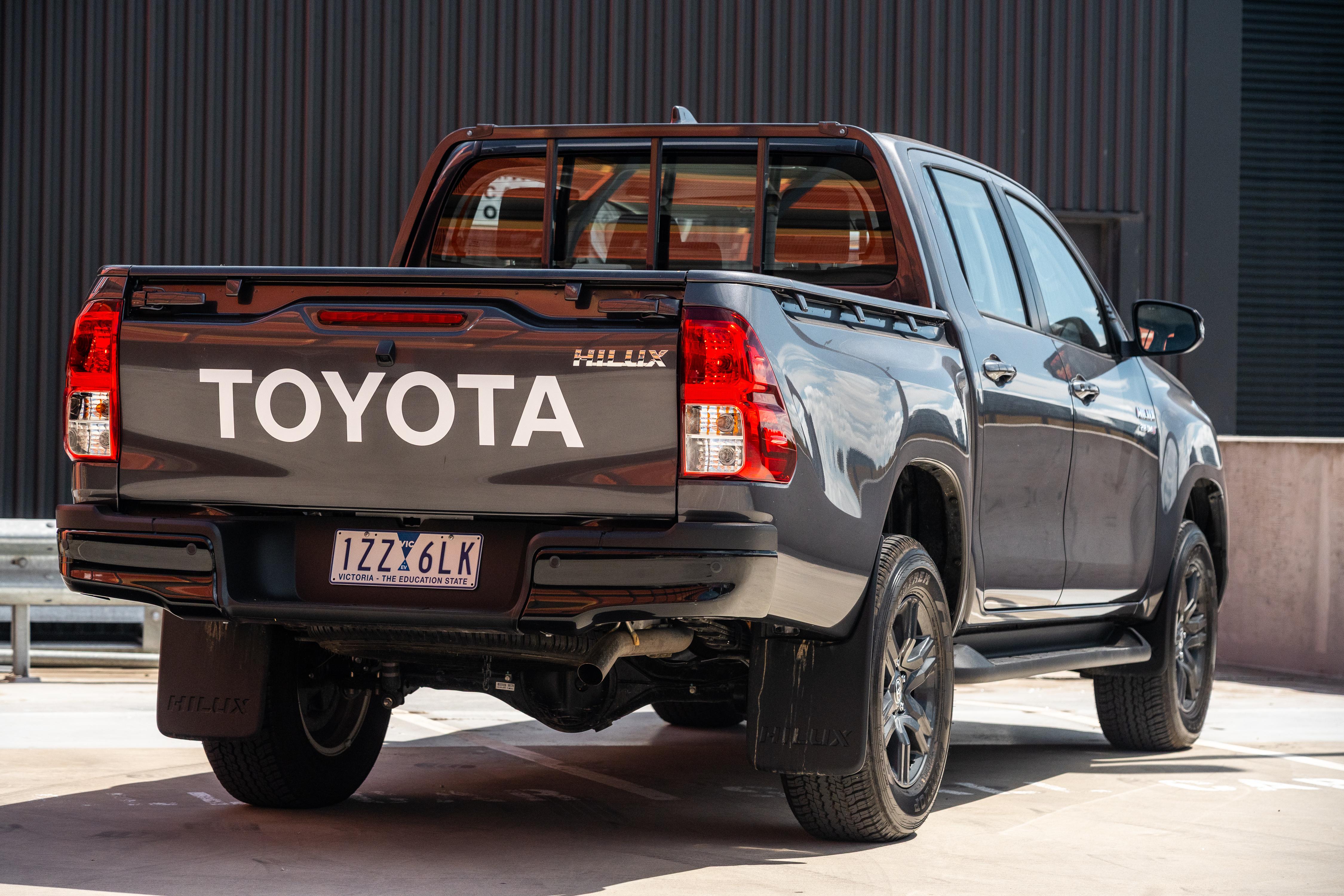
The new model is expected to be unveiled later this year, before local deliveries kick off in 2026. As for the eighth-gen HiLux? Well consider this its farewell lap.
First introduced in 2015, the current HiLux has carried the historical success of the nameplate to new heights.
That’s especially true Down Under, as Toyota’s iconic pickup was crowned Australia’s best-selling vehicle seven years in a row from 2016 to 2022.
Even now it remains a favourite among Australian ute buyers, but the market has shifted substantially over recent years. Which begs the question – is the decade-old HiLux still relevant in 2025, or should you hold out for the new model? Read on to find out.
How much does the Toyota HiLux cost?
Our tester for this review is the SR with V-Active Technology, which is only available with dual-cab versions of the HiLux, more specifically from SR trim up.
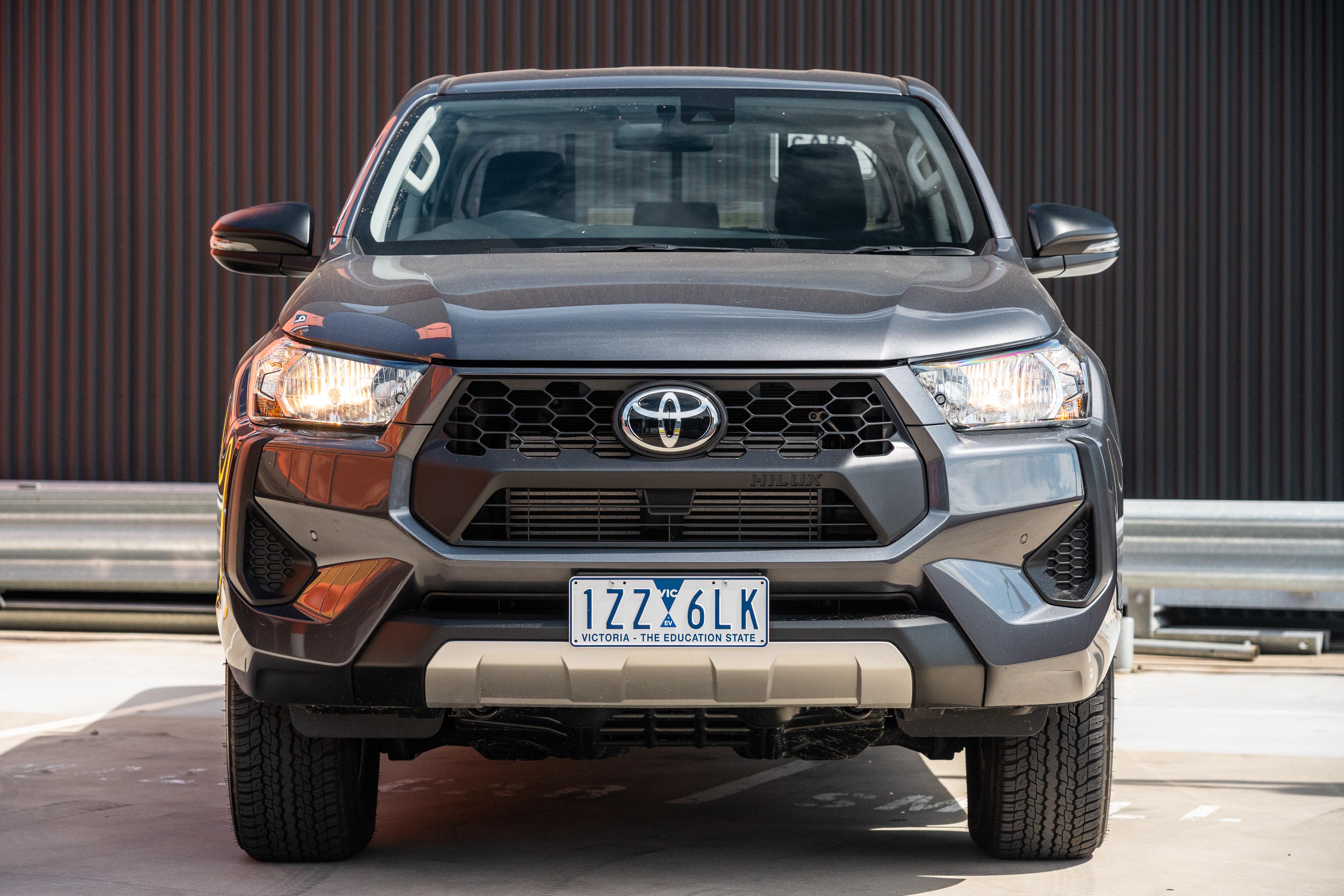
4×4 dual-cab chassis
| Model | Price before on-road costs |
|---|---|
| 2025 Toyota HiLux Workmate 2.4TD 6AT | $48,735 |
| 2025 Toyota HiLux SR 2.8TD 6MT | $50,955 |
| 2025 Toyota HiLux SR 2.8TD 6AT | $53,105 |
| 2025 Toyota HiLux SR 2.8TD 6AT with V-Active | $54,130 |
| 2025 Toyota HiLux SR5 2.8TD 6AT with V-Active | $60,580 |
HiLux 4×4 dual-cab pickup
| Model | Price before on-road costs |
|---|---|
| 2025 Toyota HiLux Workmate 2.4TD 6MT | $48,420 |
| 2025 Toyota HiLux Workmate 2.4TD 6AT | $50,420 |
| 2025 Toyota HiLux SR 2.8TD 6MT | $52,640 |
| 2025 Toyota HiLux SR 2.8TD 6AT | $55,190 |
| 2025 Toyota HiLux SR 2.8TD 6AT with V-Active | $56,210 |
| 2025 Toyota HiLux SR5 2.8TD 6MT | $60,670 |
| 2025 Toyota HiLux SR5 2.8TD 6AT with V-Active | $63,260 |
| 2025 Toyota HiLux Rogue 2.8TD 6AT with V-Active | $71,530 |
| 2025 Toyota HiLux GR Sport 2.8TD 6AT | $74,310 |
If you want to see how the Toyota HiLux lines up against the competition, check out our comparison tool
What is the Toyota HiLux like on the inside?
Certainly a throwback, that’s for sure.
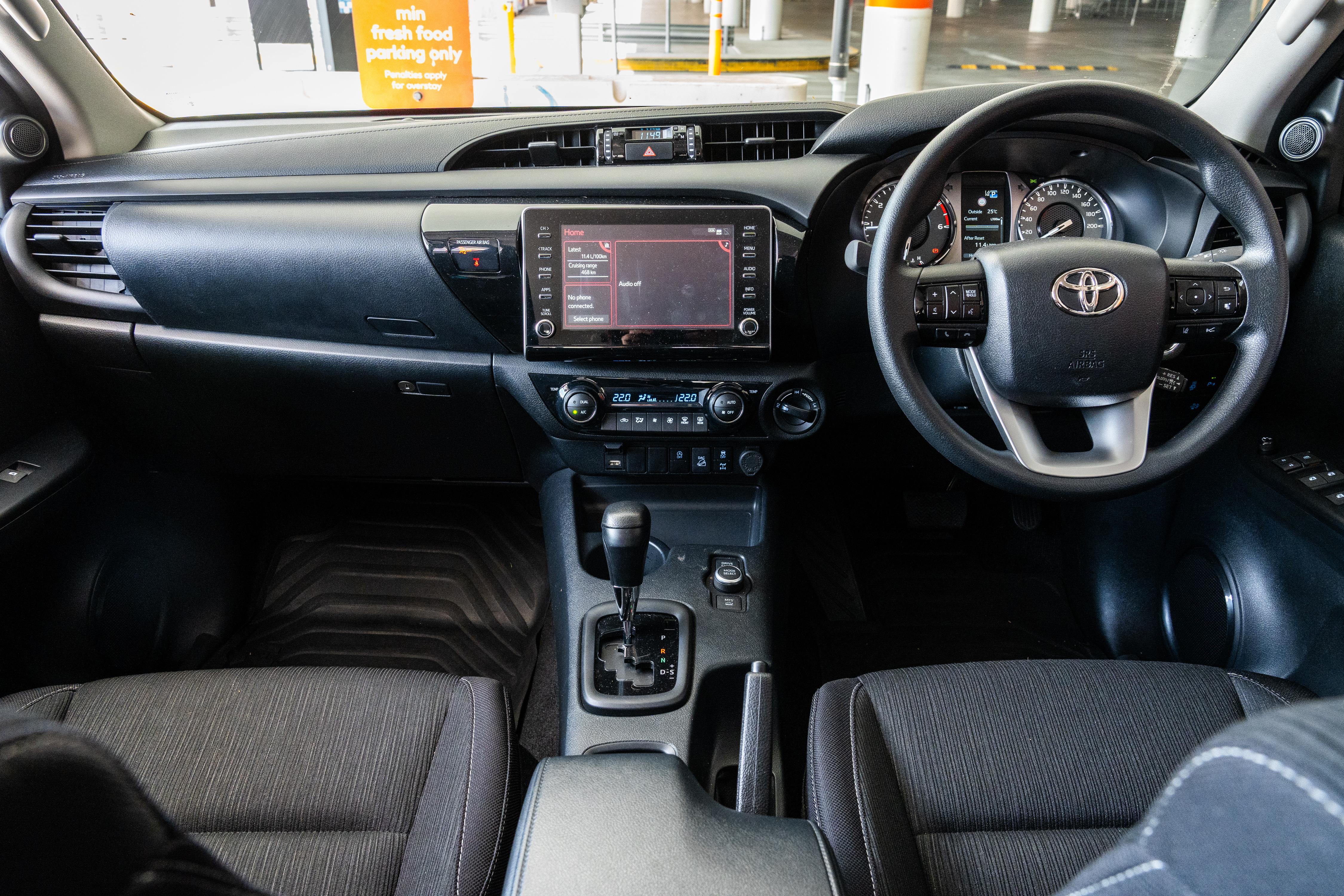
The general layout and feel of the cabin harkens back to the mid-2010s when this model debuted, and only minor changes have been made throughout the ensuing decade.
You won’t find a fancy digital instrument display, nor new age materials. Rather, this HiLux SR is a stripped back ute that prioritises the bare essentials.
The technology suite consists of a functional 8.0-inch infotainment touchscreen and a skinny digital display sandwiched between old-school analogue gauges.
Smartphone mirroring requires a USB-A wired connection, but CarPlay is definitely preferable to Toyota’s native interface, which doesn’t offer a whole lot outside of audio and phone functions.
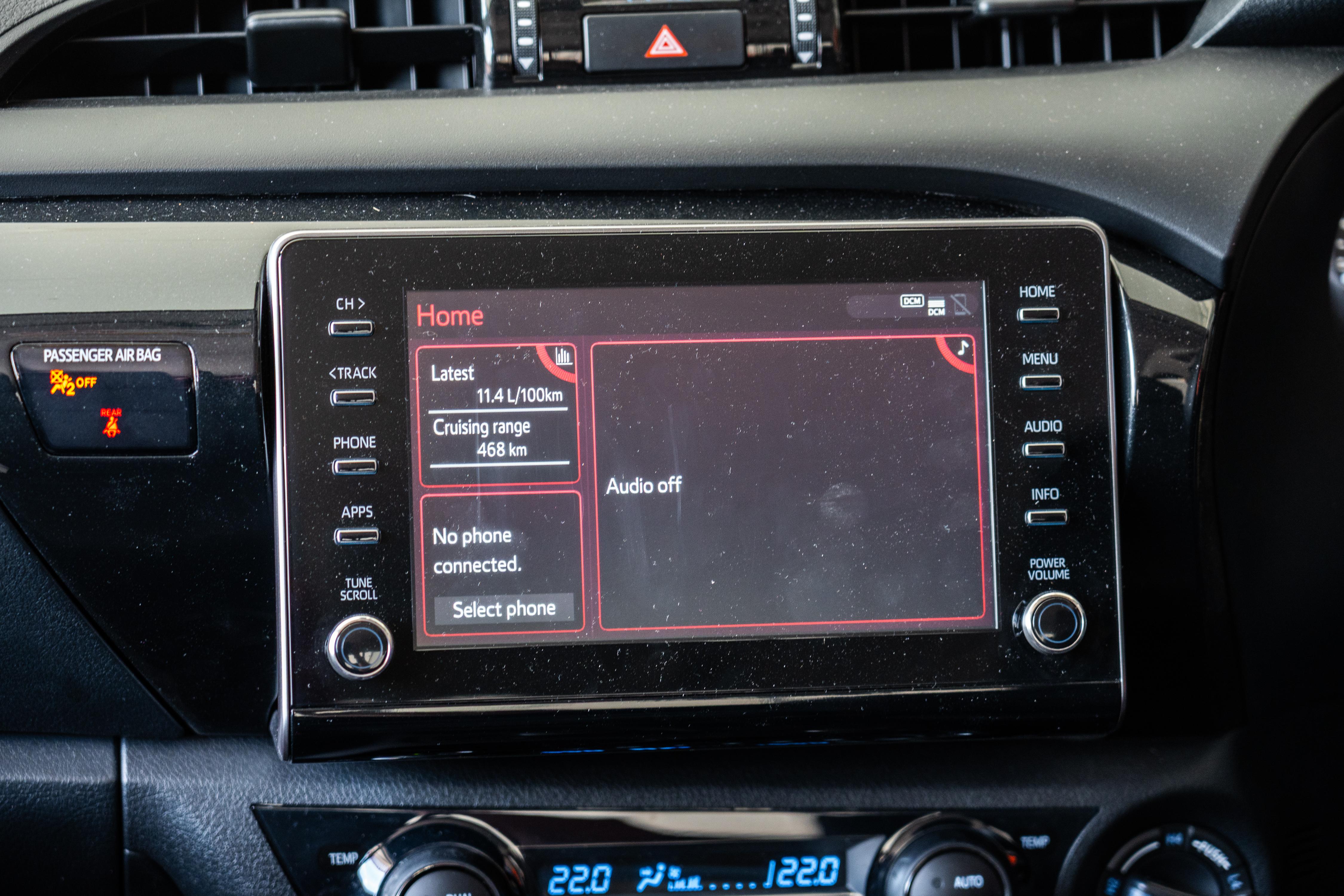
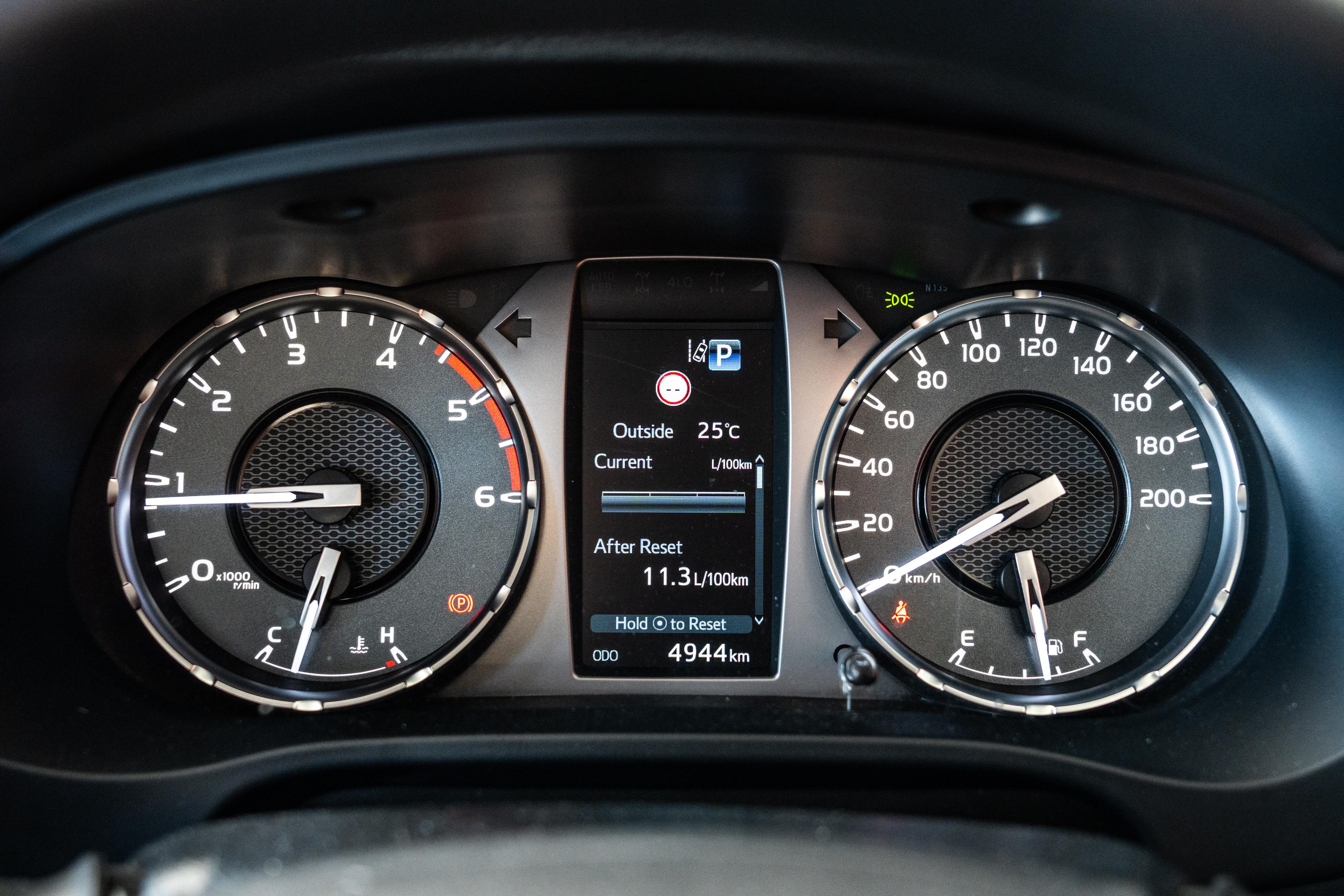
Toyota seemingly recognises this, as the screen housing contains physical shortcut buttons that make it easy to jump in and out of smartphone mirroring. Regardless of how you use the system, the graphics are fuzzy and it’s not the most responsive unit.
But I guess the lack of functionality means that you’ll never be tripped up when searching for something. Ease of use is aided by the aforementioned shortcut buttons on each side of the screen.
In a similar vein, the climate controls are no nonsense, although this is an area where innovation doesn’t count for as much.
The same can be said of materials, although at this price point the HiLux SR now feels especially workmanlike. Just about every surface in finished in rock hard black plastic, with the exception being a small section of padded cloth on the door cards. Even the steering wheel is finished in plastic.
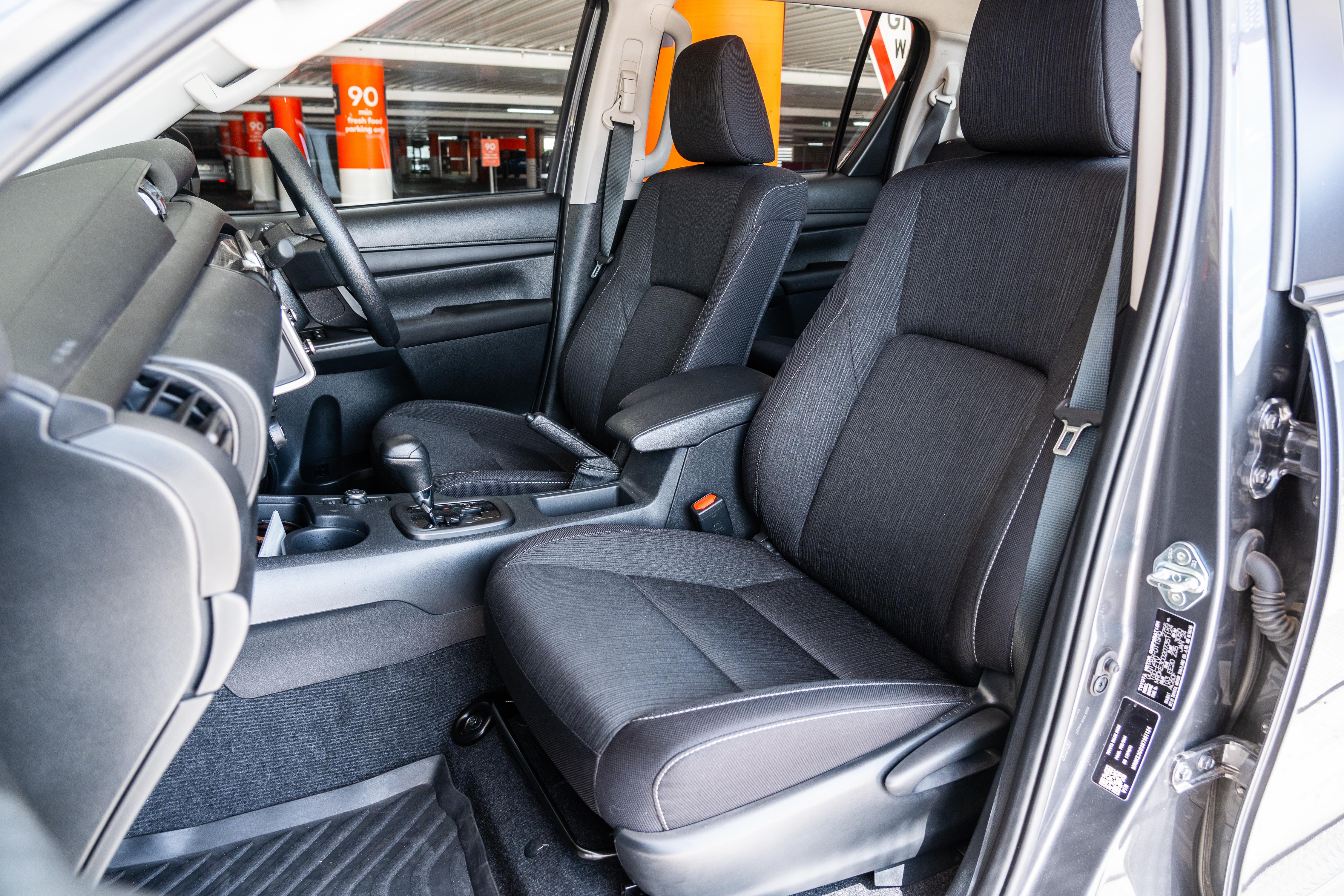
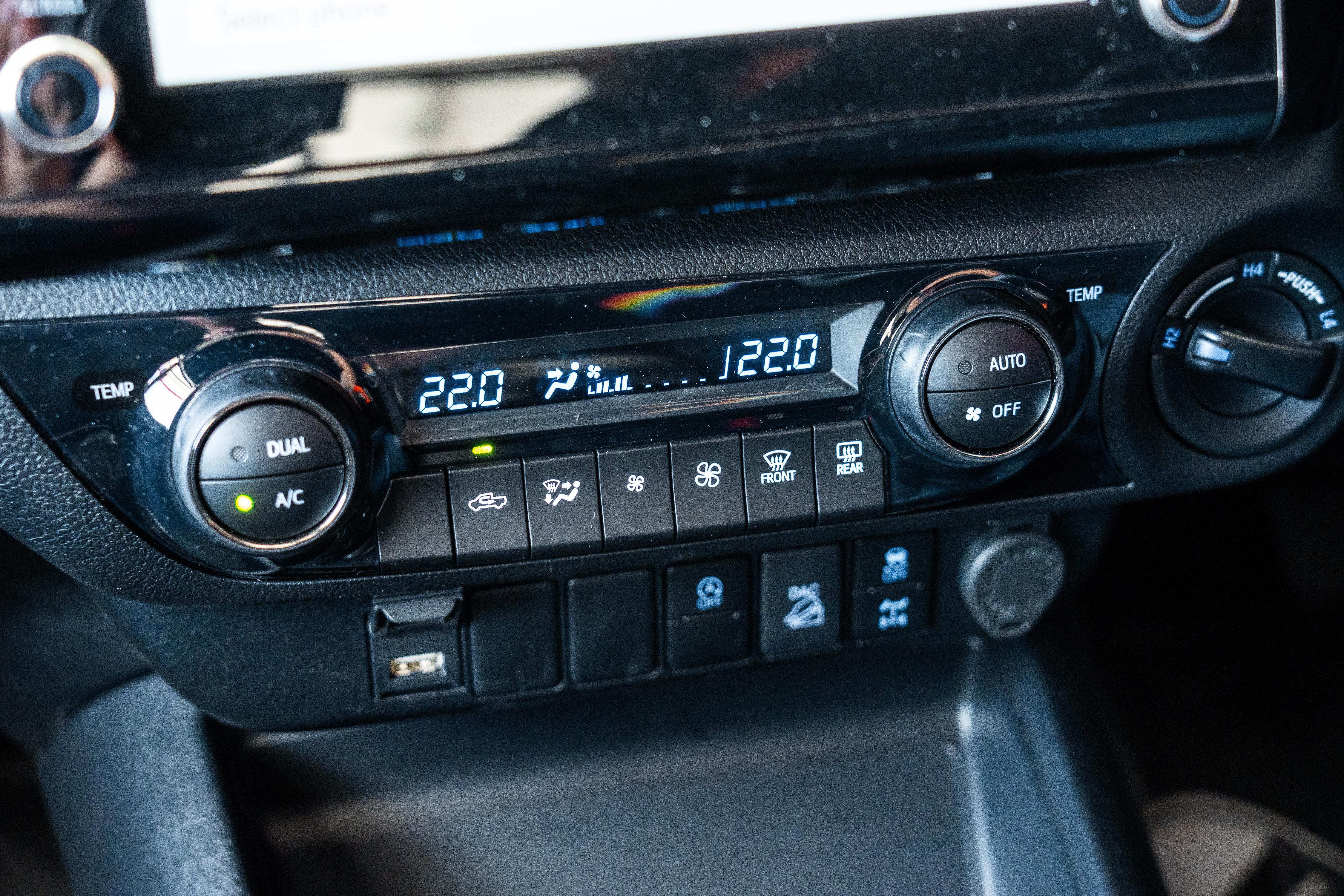
While there’s nothing inherently wrong about a ute interior that’s hardy and resistant to damage, most alternatives in the $55-60k ballpark feel far more premium yet no less hardwearing. The Ford Ranger and Kia Tasman are excellent examples of this, while the BYD Shark 6 leans further towards luxury.
While many of the touch points in the HiLux SR feel a little bit nasty, the seats are at least comfortable and fit for purpose. Trimmed in black cloth, the front pews feature a wide range of manual adjustment, as does the steering wheel.
Storage never goes out of style, and the HiLux remains well equipped in this domain. In addition to all the usual nooks you’d expect to find in a ute, you also get a hidden dash compartment, tradie-style pop-out cupholders in the dash, and a sunglasses holder.
The front row may come off a little bare bones, but the second row takes that to another level.
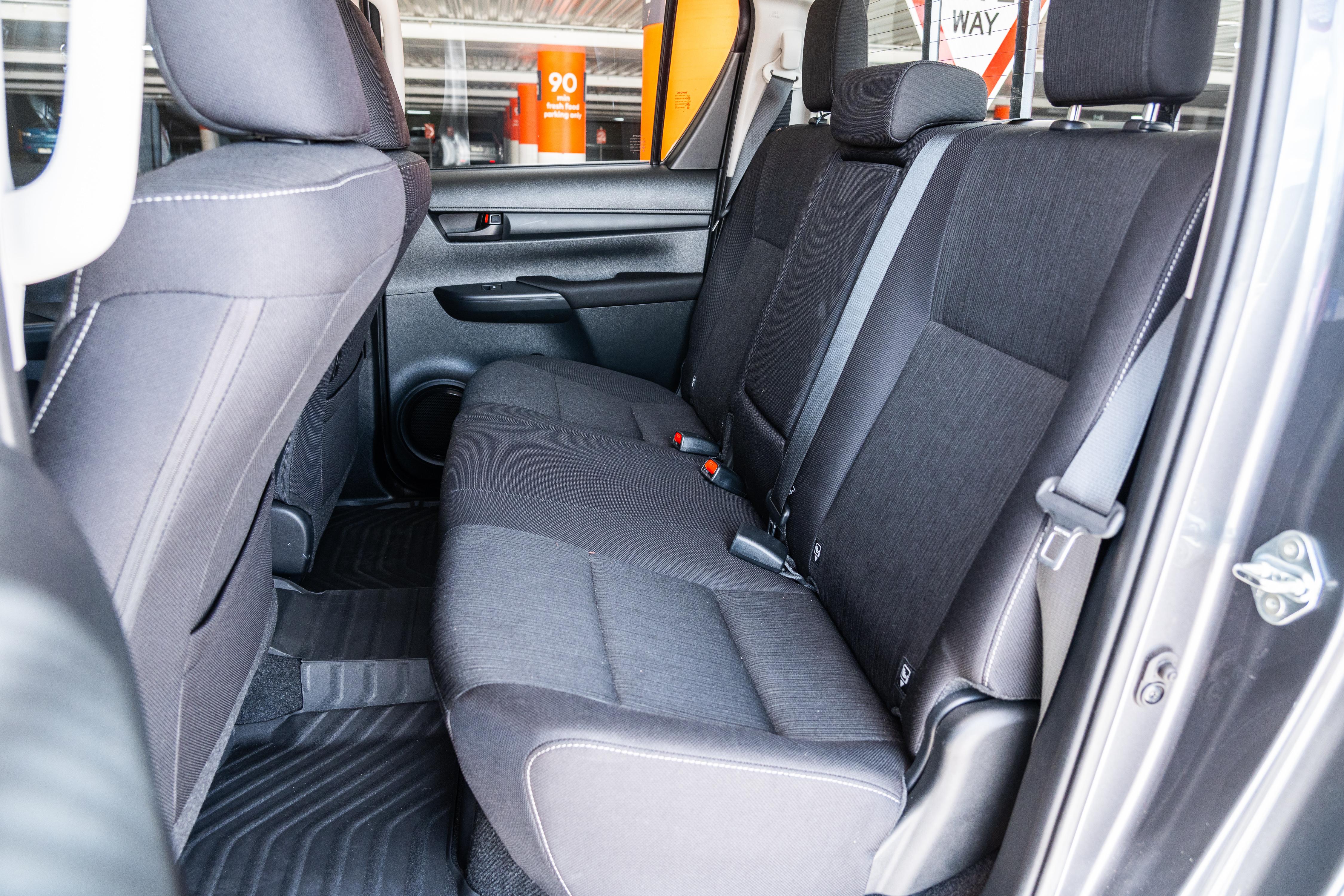
Not only is it a bit cramped for a space that’ll be expected to accomodate two adults, but basic amenities like air vents and USB outlets are missing altogether.
At six-one, I only just managed to squeeze in behind my driving position, with my knees pressing against the seat back and my hair grazing the headlining. The seating position is very upright, too, so it’s hard to get properly settled.
While creature comforts are in short supply, there’s still a few storage options including shallow map pockets, skinny door bins, and a centre armrest with integrated cupholders. But that doesn’t distract from the fact that you’d much rather be in the back of a Ranger, Shark, or even a Nissan Navara for that matter.
So, what about the tub? It’s roomier than most, but that space isn’t always usable. That’s because Toyota quotes a relatively meagre payload of 915kg for the HiLux SR V-Active, limiting what you can and can’t throw in the back.
Ignoring its size for a moment, there’s not much to set the tub apart from rival offerings. Tie down points and other practical features are lacking, as is some sort of bedliner. With that being said, the fitment of gas struts prevents the tailgate from slamming.
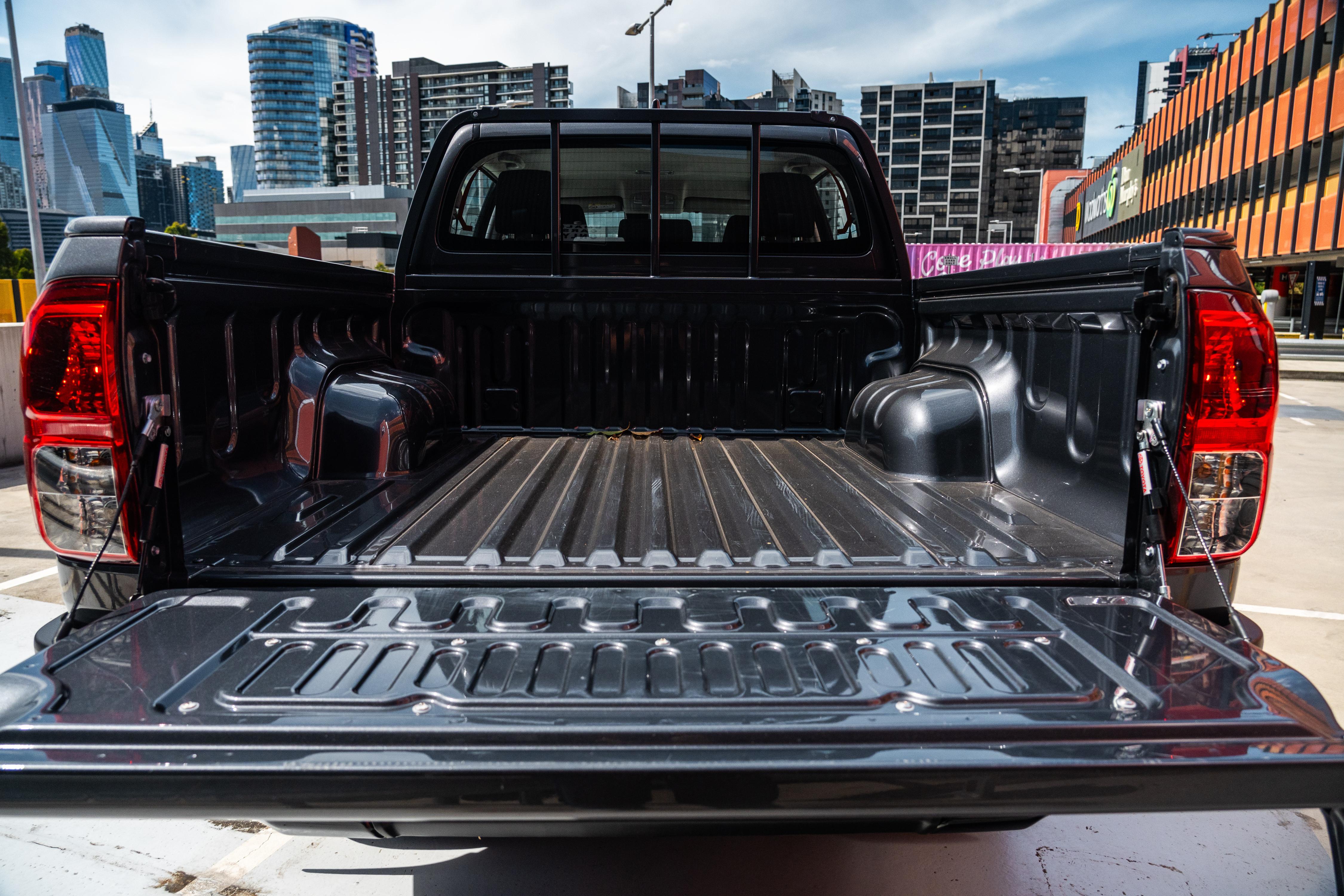
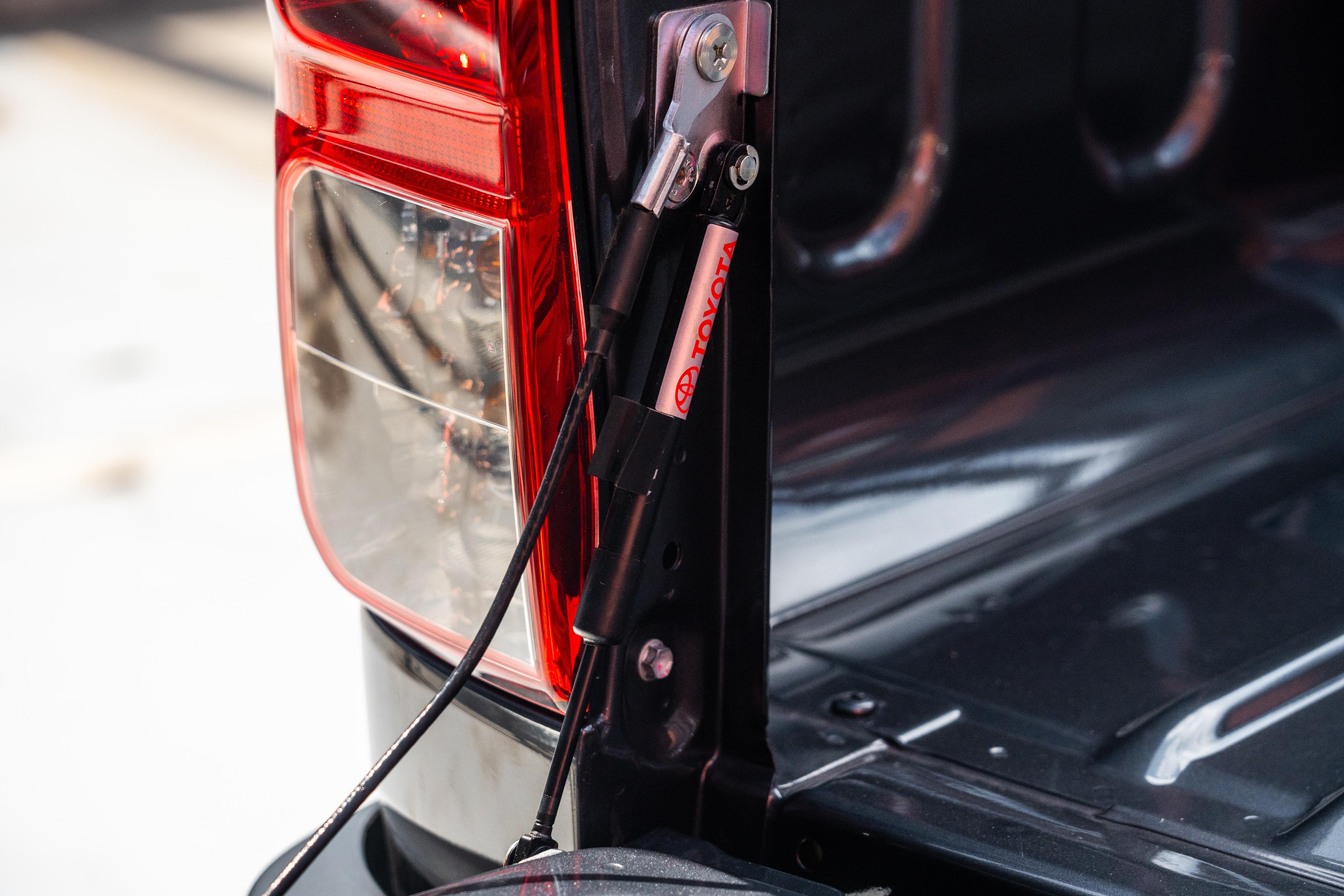
| Dimensions | Toyota HiLux SR V-Active |
|---|---|
| Length | 5325mm |
| Width | 1855mm |
| Height | 1865mm |
| Wheelbase | 3085mm |
| Tub volume | 1270L (approx.) |
| Tub length | 1570mm |
| Tub width | 1645mm |
| Tub depth | 481mm |
If you want to see how the Toyota HiLux lines up against the competition, check out our comparison tool
What’s under the bonnet?
The V-Active system comprises a motor generator, 48-volt battery and DC/DC converter, and is paired with the familiar 2.8-litre four-cylinder turbo-diesel engine.
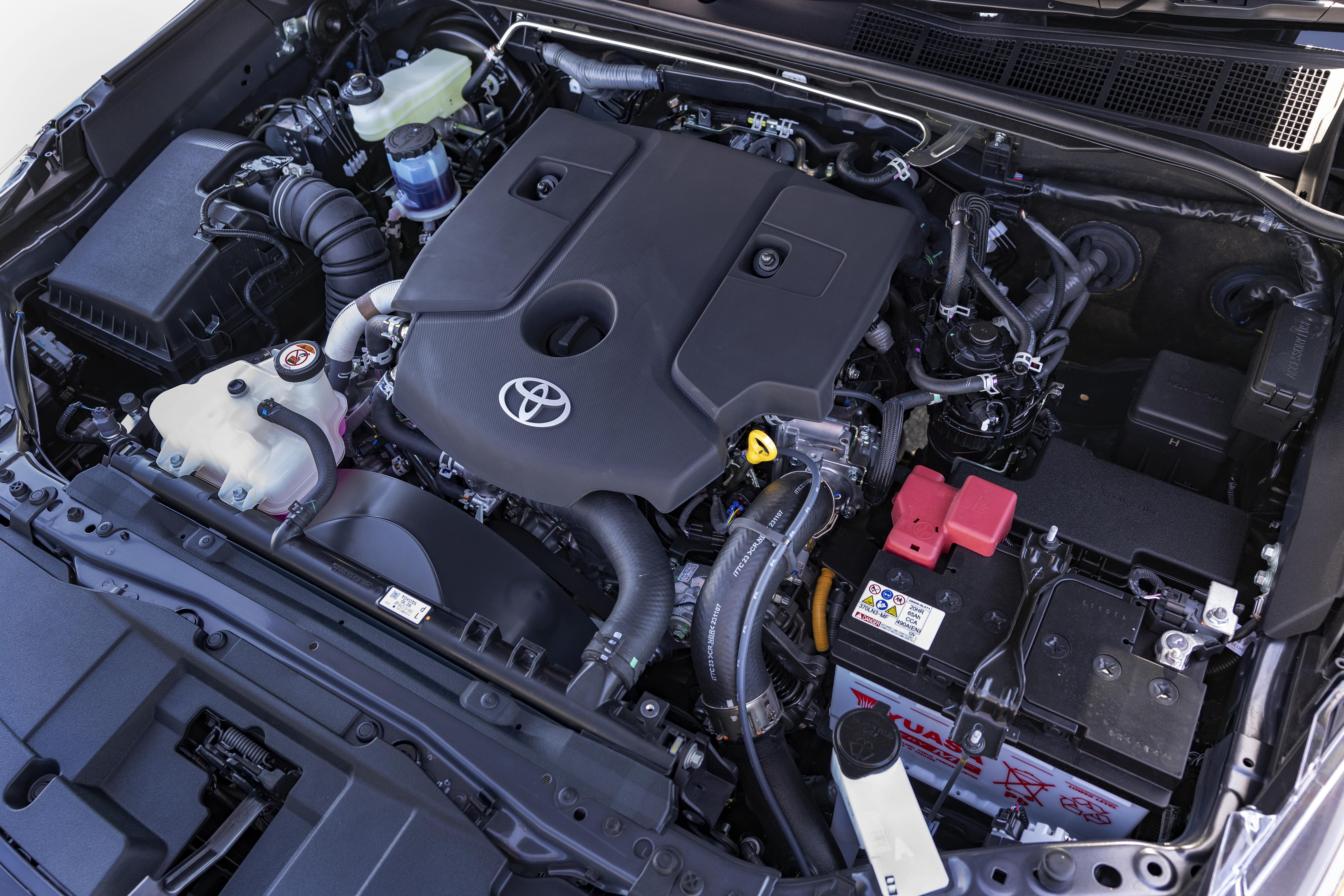
| Specifications | Toyota HiLux SR V-Active |
|---|---|
| Engine | 2.8L 4cyl turbo-diesel with 48V mild-hybrid assist |
| Power | 150kW |
| Torque | 500Nm |
| Transmission | 6-speed automatic |
| Drive type | Four-wheel drive |
| Fuel economy (claimed) | 7.4L/100km |
| Fuel economy (as tested) | 11.1L/100km |
| CO2 emissions | 195g/km |
| Fuel tank | 80L |
| Weight | 2135kg |
| Payload | 915kg |
| Braked towing capacity | 3500kg |
| Gross vehicle mass (GVM) | 3050kg |
| Gross combination mass (GCM) | 5850kg |
Automatic stop/start is standard, and the motor generator can recover energy during deceleration which is fed back into the battery. Energy stored in the battery can then be used to provide additional power when accelerating.
Models with the V-Active system also gain Toyota’s Multi-Terrain off-road system. In high range, you can select between Auto, Dirt, Sand, Mud and Deep Snow modes, while in low range you can choose between Auto, Sand, Mud and Rock.
Toyota says the motor generator unit is positioned high in the engine bay “to allow for successful and safe water crossings”.
If you want to see how the Toyota HiLux lines up against the competition, check out our comparison tool
How does the Toyota HiLux drive?
The introduction of mild-hybrid assistance saves some fuel in the city, but otherwise the HiLux remains true to its roots.
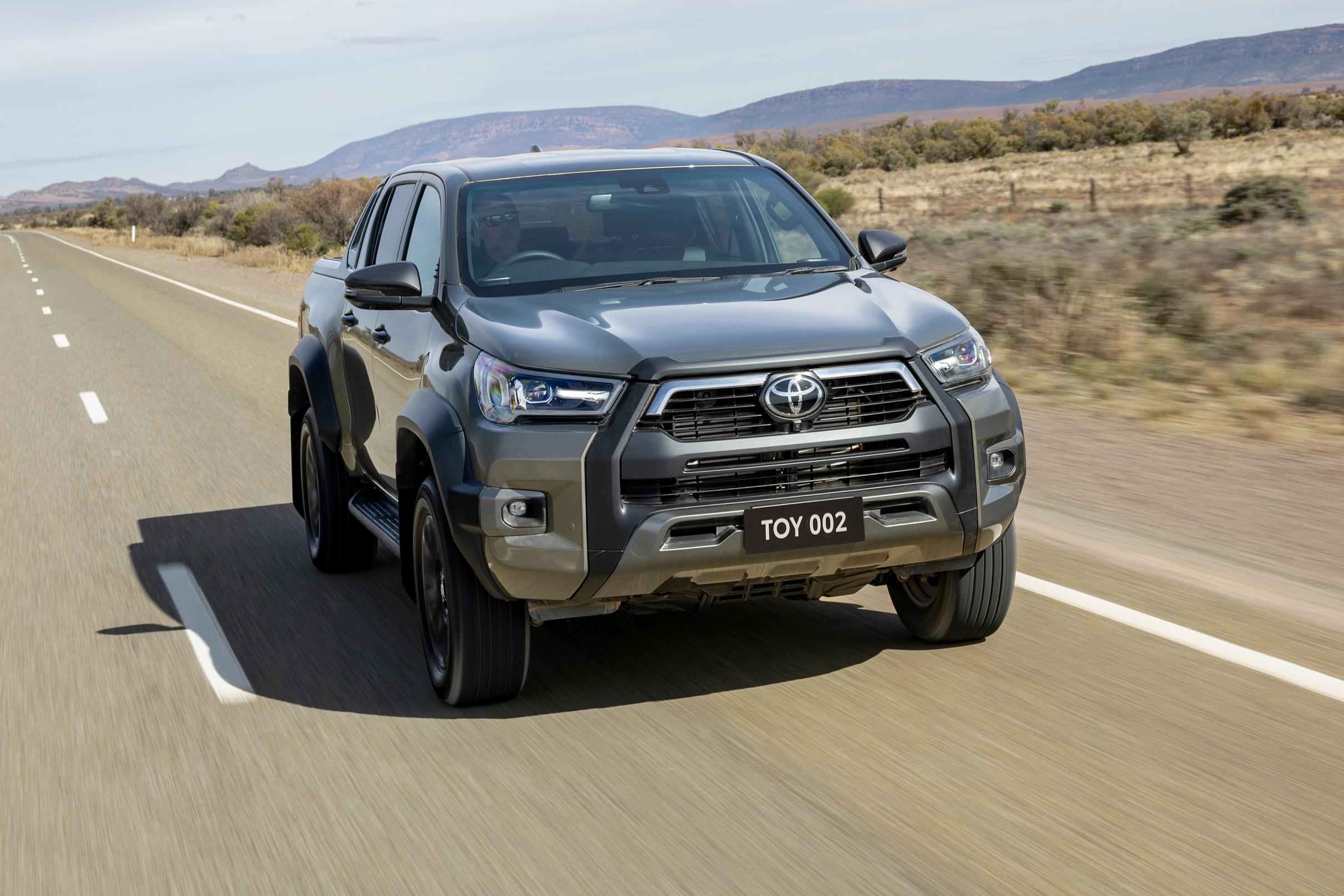
Above: HiLux Rogue V-Active shown
It’s still a big turbo-diesel workhorse, and that’s immediately apparent from the driver’s seat.
You notice the heavy nature of the hydraulic steering rack at low speeds, and the 2.8-litre four-cylinder sings a familiar tune.
Although a decent chunk of time has passed since Toyota first introduced this powertrain, it’s still serviceable in 2025. Acceleration from a standstill is adequate, if not overly impressive, but the HiLux SR doesn’t feel any more sluggish than most diesel dual-cabs bar the more expensive V6 Ranger.
That could in part be attributed to the mild-hybrid system, which has been proven to add grunt when accelerating. The electric motor generator is capable of producing up to 8.4kW and 65Nm, although it never solely powers the wheels.
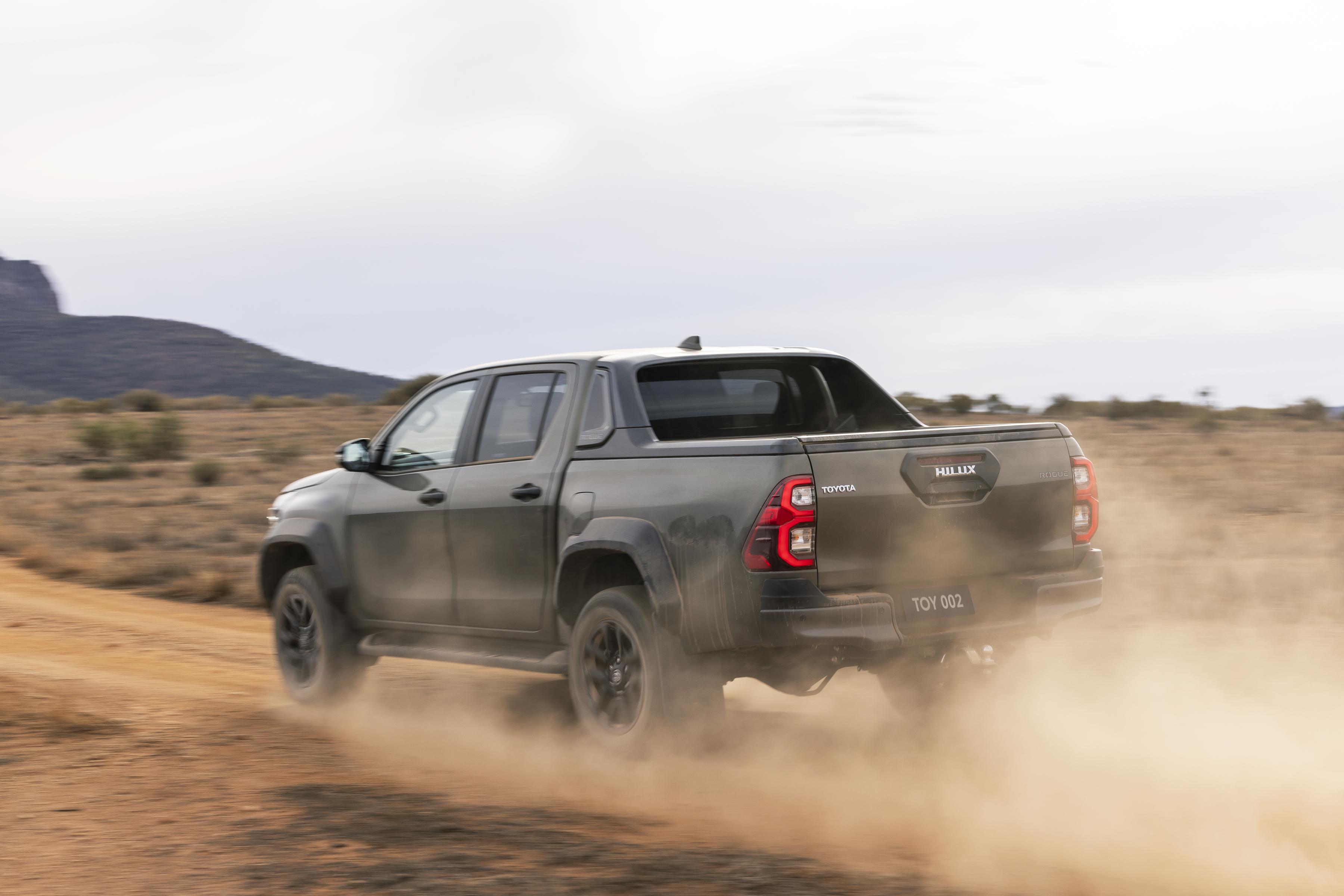
Instead, think of V-Active as an extended start-stop technology that saves fuel by allowing the engine to switch off when the car is stationary. When you release the brake pedal, it instantly fires back to life.
As you might imagine, the mild-hybrid system isn’t really worthwhile if you spend most of your commute on the highway, as it never gets the chance to do its thing. Nevertheless, V-Active is a nice-to-have for city slickers.
However, aside from some clever engine tech, the HiLux isn’t really suited to the urban lifestyle.
It feels big on the road, especially in tight areas like multi-story carparks, and you’re constantly checking mirrors to keep the corners of the tub out of harms way. Speaking of parking, the reversing camera is poor by modern standards, and even when perfectly parked the HiLux exceeds the limits of smaller city parking spaces.
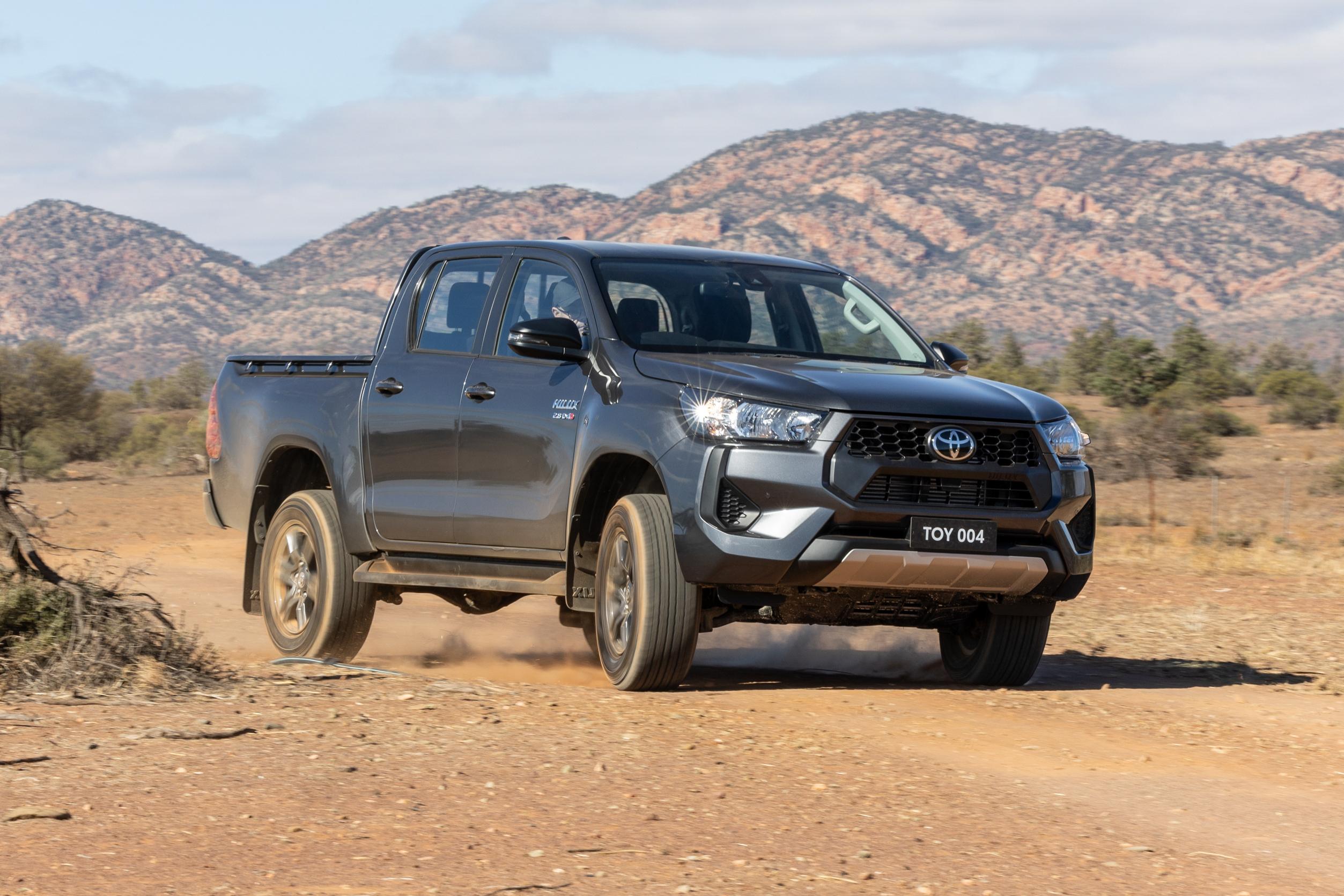
At lower speeds the HiLux SR V-Active also exhibits a jittery ride, transmitting excessive levels of vibration into the cabin. When unladen, the rear gets a bit loose over speed humps too, but that’s not unusual for the segment.
Many of the HiLux’s shortcomings fade into the background on the highway, however. Despite its agricultural ingredients, the HiLux is a relatively refined cruiser that suppresses both wind and road noise to a pleasing degree. The ride settles at higher speeds, too.
Adaptive cruise control is among the standard features, although it’s quite a basic system. There’s no form of active lane centring and the HiLux can be slow to respond to slowing traffic, forcing the driver to intervene and hit the brakes.
SR variants also lack increasingly common safety aids such as blind-spot monitoring, rear cross-traffic alerts, and surround-view cameras. It’s safe to assume the next-gen HiLux will gain the latest and greatest safety tech that Toyota has to offer.
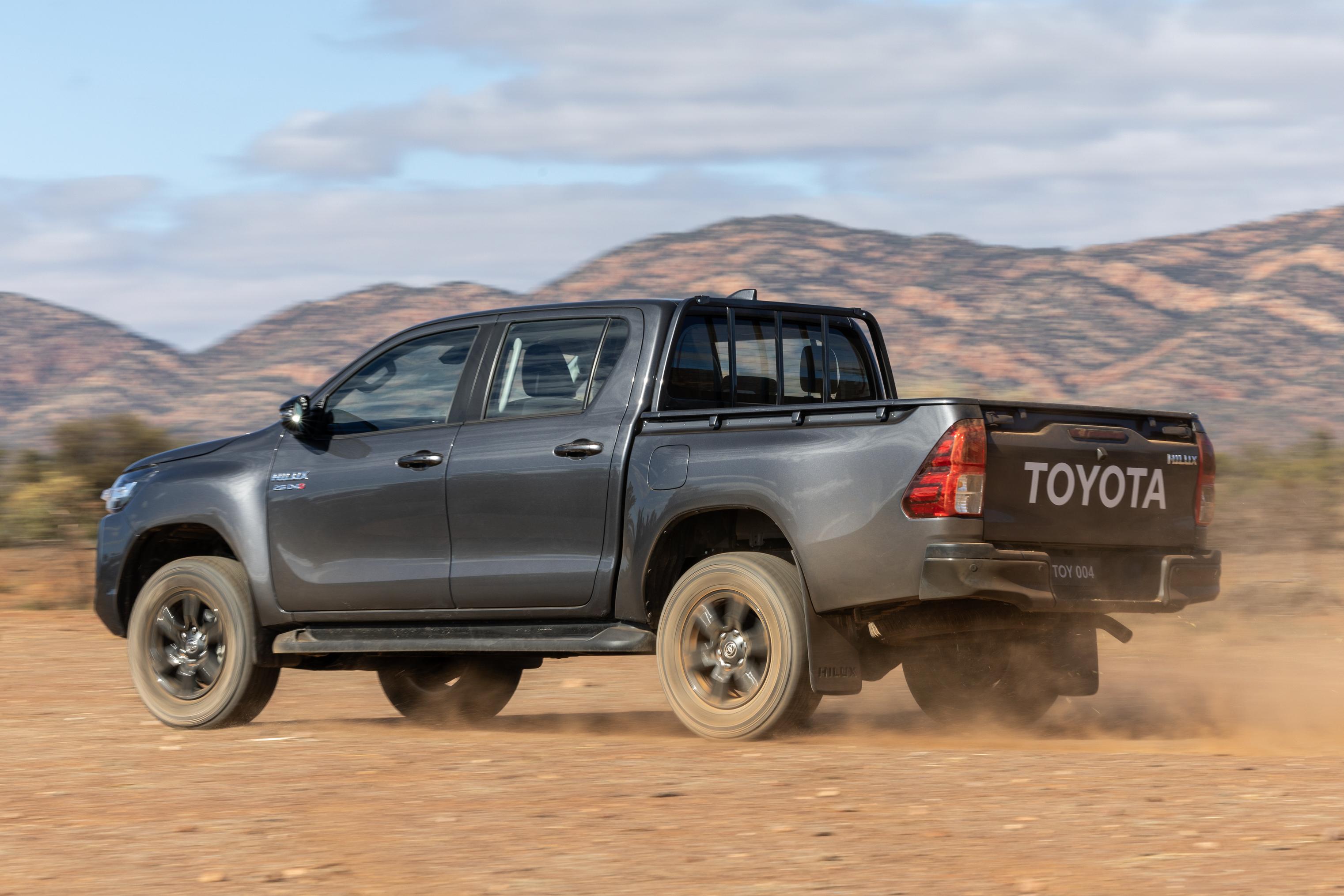
We didn’t get the chance to take the SR V-Active off the beaten track for this test, but there’s a reason many consider the HiLux to be ‘unbreakable’.
In addition to selectable four-wheel drive with low range, you get a locking rear differential, hill descent control, and a choice of various off-road drive modes.
| Off-road dimensions | Toyota HiLux SR V-Active |
|---|---|
| Track front and rear | 1535mm front, 1550mm rear |
| Ground clearance | 216mm |
| Approach angle | 29 degrees |
| Departure angle | 27 degrees |
| Ramp breakover angle | N/A |
| Wading depth | 700mm |
If you want to see how the Toyota HiLux lines up against the competition, check out our comparison tool
What do you get?
The SR sits towards the bottom of the HiLux range, although V-Active variants are better equipped than the rest.
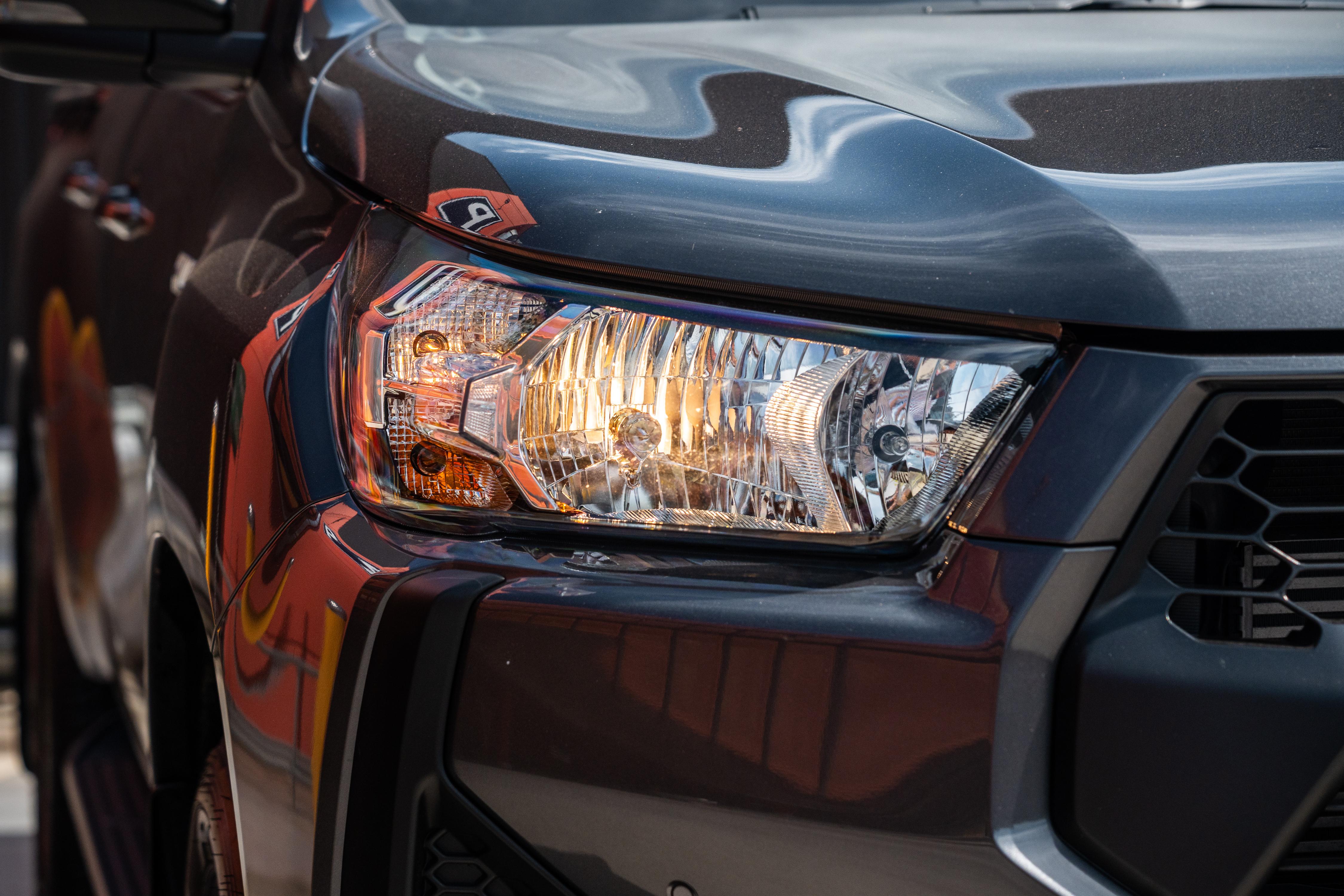

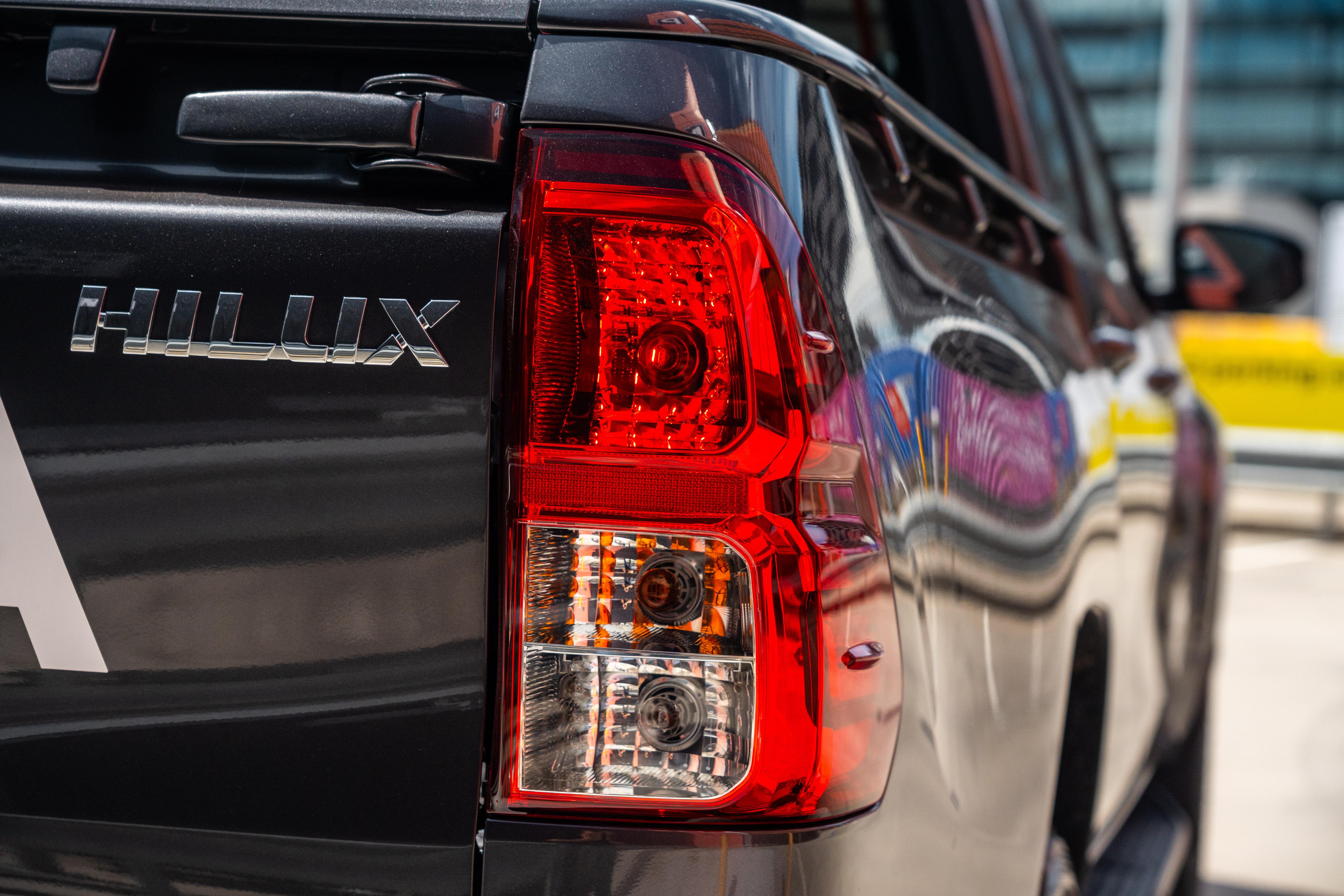

2025 Toyota HiLux Workmate equipment highlights:
- 8.0-inch touchscreen infotainment system
- Wired Android Auto and Apple CarPlay
- Two-speaker sound system
- Adaptive cruise control
- Automatic headlights
- Air-conditioning
- Power windows
- Cloth upholstery
- Vinyl floors
- Halogen headlights and daytime running lights
- Reversing camera (Double Cab ute only)
- Front and rear parking sensors (Double Cab ute only)
- 16-inch wheels (17-inch in Double Cab, 4×4 variants)
SR adds:
- Multi-Terrain Select with six selectable modes
- Hill descent control
- Side steps
- 17-inch alloy wheels
- Body-coloured door handles
- Four- or six-speaker sound system (Extra Cab and Double Cab, respectively)
- Dual-zone climate control (V-Active only)
- Auto up/down windows (V-Active only)
- Keyless entry and start (V-Active only)
- Carpet floor mats (V-Active only)
- Front air-conditioned cooler box
SR5 adds:
- Dark-finish LED headlights
- Gloss black exterior mirrors and door handles
- Powder-coated black sports bar
- 18-inch alloy wheels
- Privacy glass
- Satellite navigation
- DAB+ digital radio
- Rear air vents
- ‘Premium’ shifter and steering wheel
- Wireless phone charger
- 2 x rear USB-C outlets
- Carpeted floors
Rogue adds:
- Nine-speaker JBL sound system
- Motorised roller cover
- Central locking tailgate
- Wider wheel racks
- 15mm taller ride height
- Ventilated rear disc brakes
- Wider wheel-arch flares
- Heated front seats
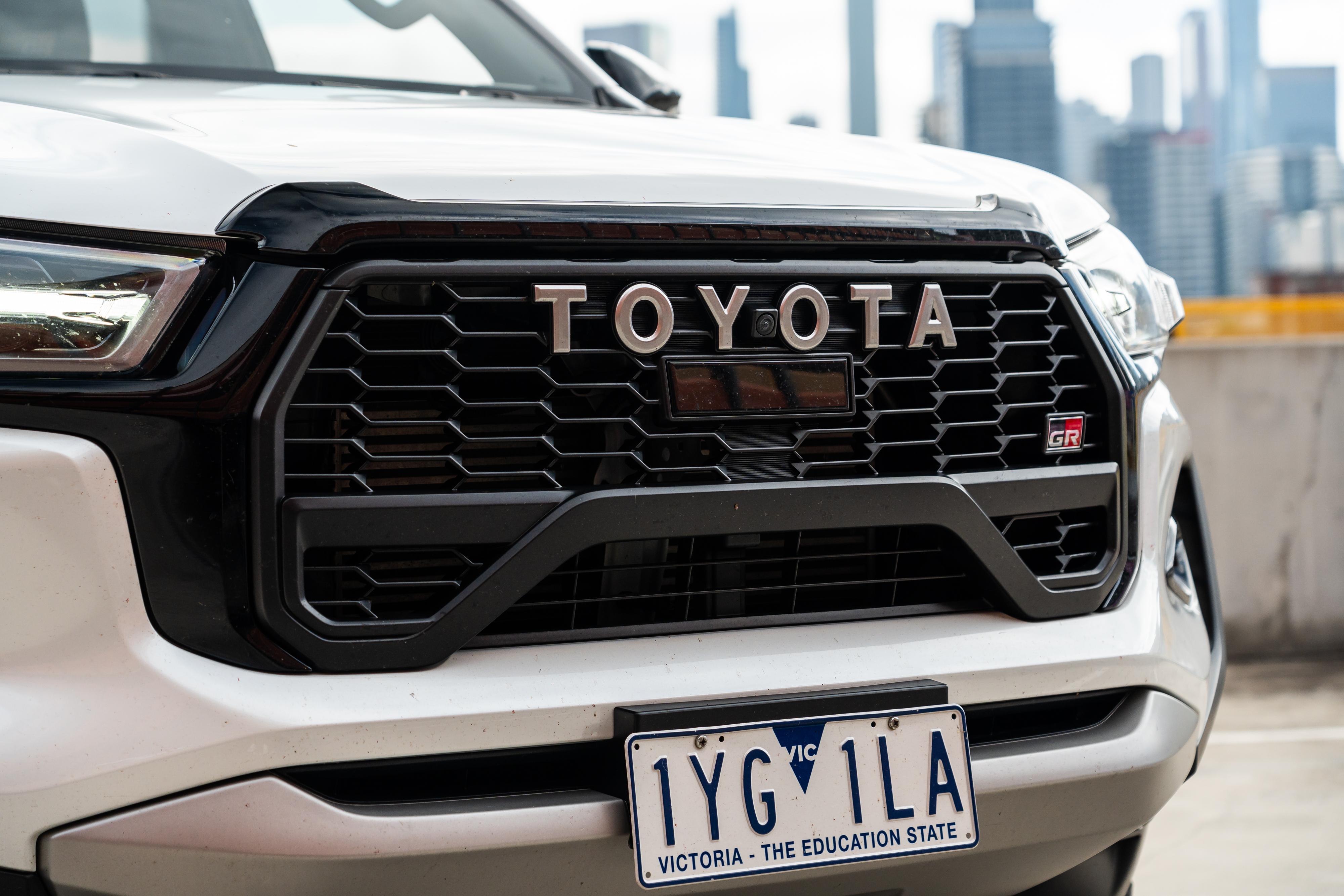
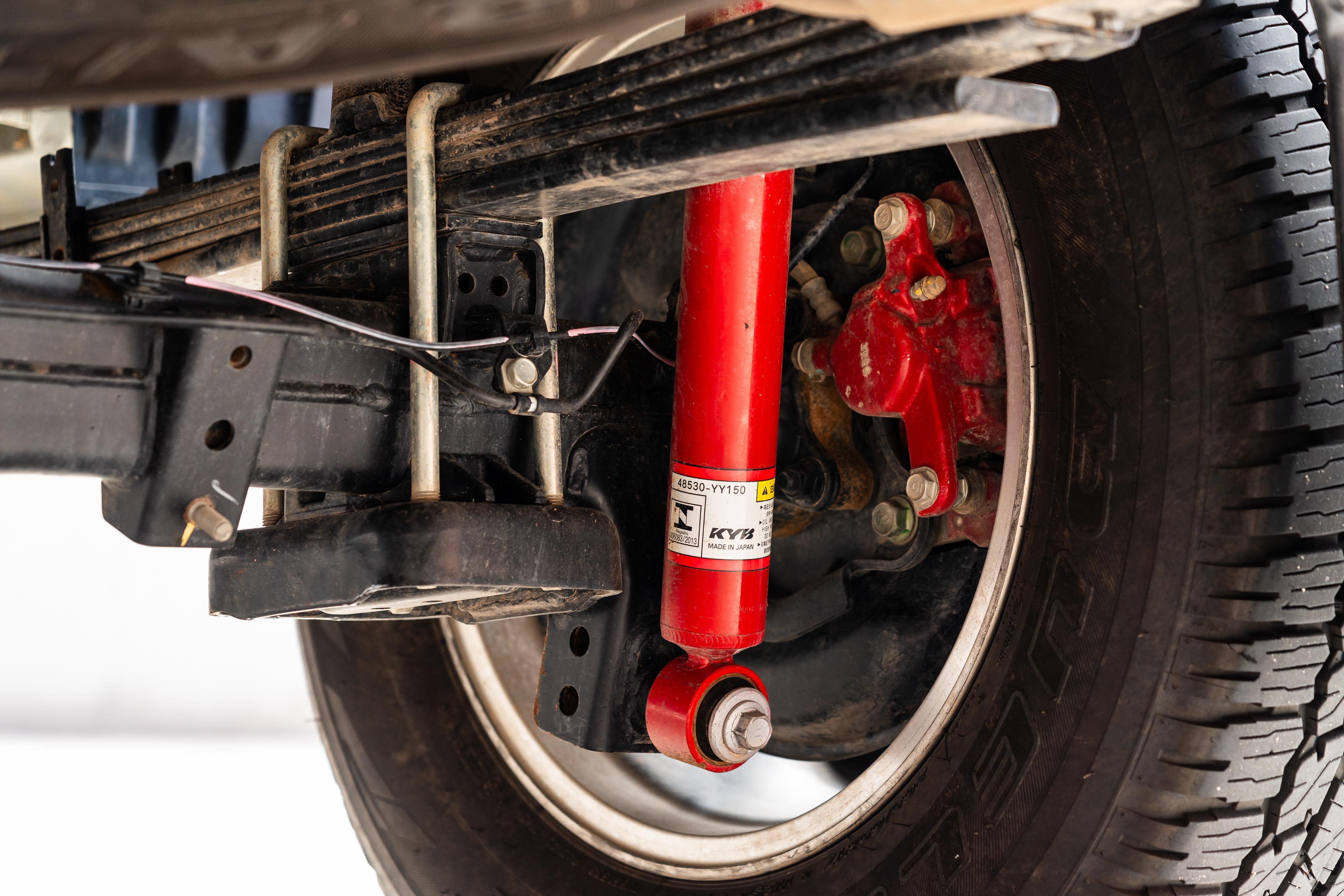
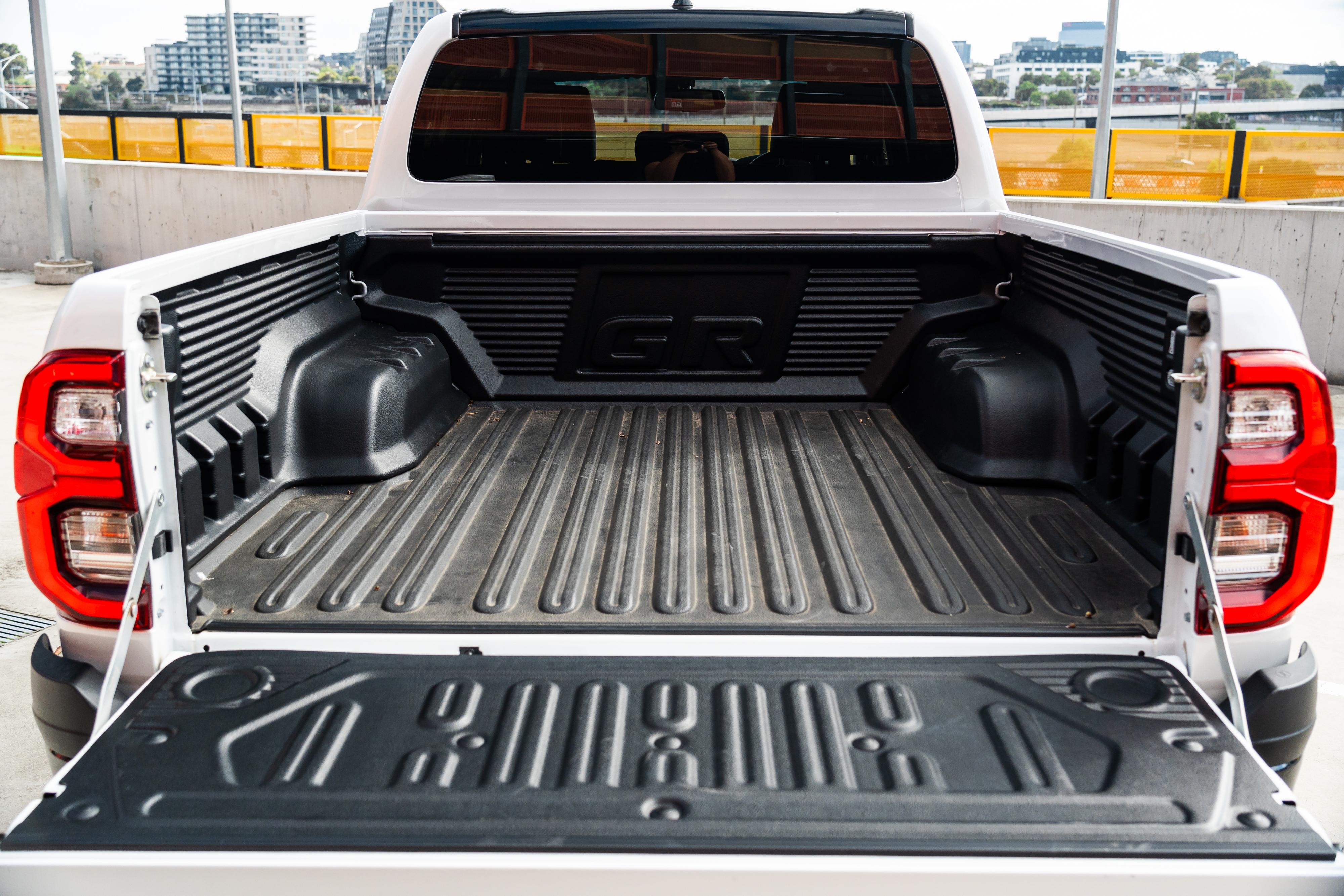
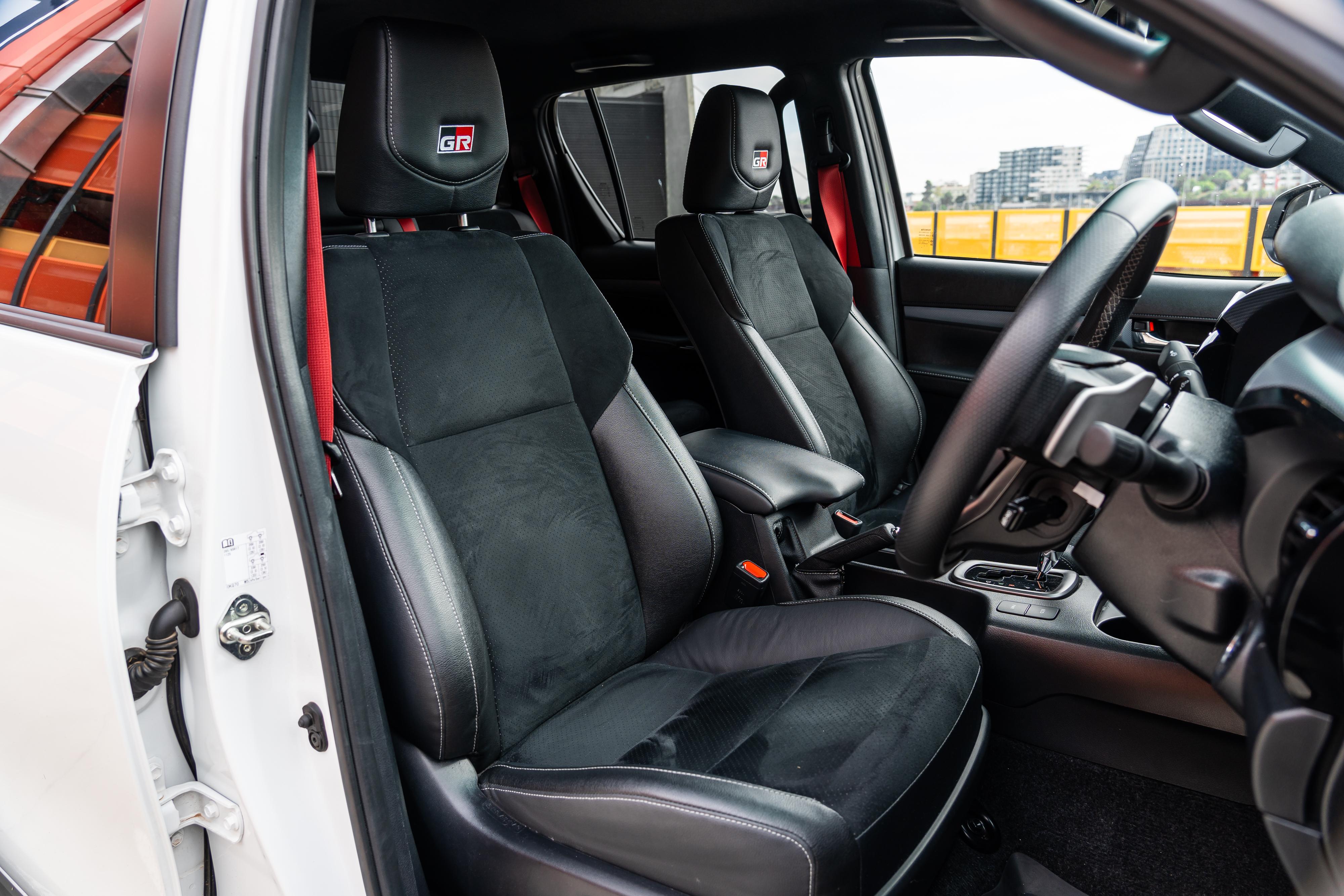
GR Sport adds:
- 17-inch alloy wheels
- Bridgestone Dueler all-terrain tyres
- KYB monotube shock absorbers
- GR Sport grille with ‘Toyota’ lettering
- GR Sport front bumper and wheel arch flares
- GR Sport bedliner
- Rear recovery points
- Skid plate
- Rock rails
- Red seatbelts
- GR Sport leather-accented door trim
- GR Sport gear knob
- GR Sport steering wheel
- Paddle shifters
- Aluminium pedals
- Leather and suede-upholstered sport bucket seats
Equipment like the electric roller cover, Multi-Terrain Select modes, central locking tailgate, and other Rogue-centric features aren’t offered in the GR Sport. There’s also no rear anti-roll bar, providing more suspension travel at the expense of rear-end stability.
If you want to see how the Toyota HiLux lines up against the competition, check out our comparison tool
Is the Toyota HiLux safe?
The core Toyota HiLux range has a five-star ANCAP safety rating based on testing conducted in 2019. That rating will expire in December this year.
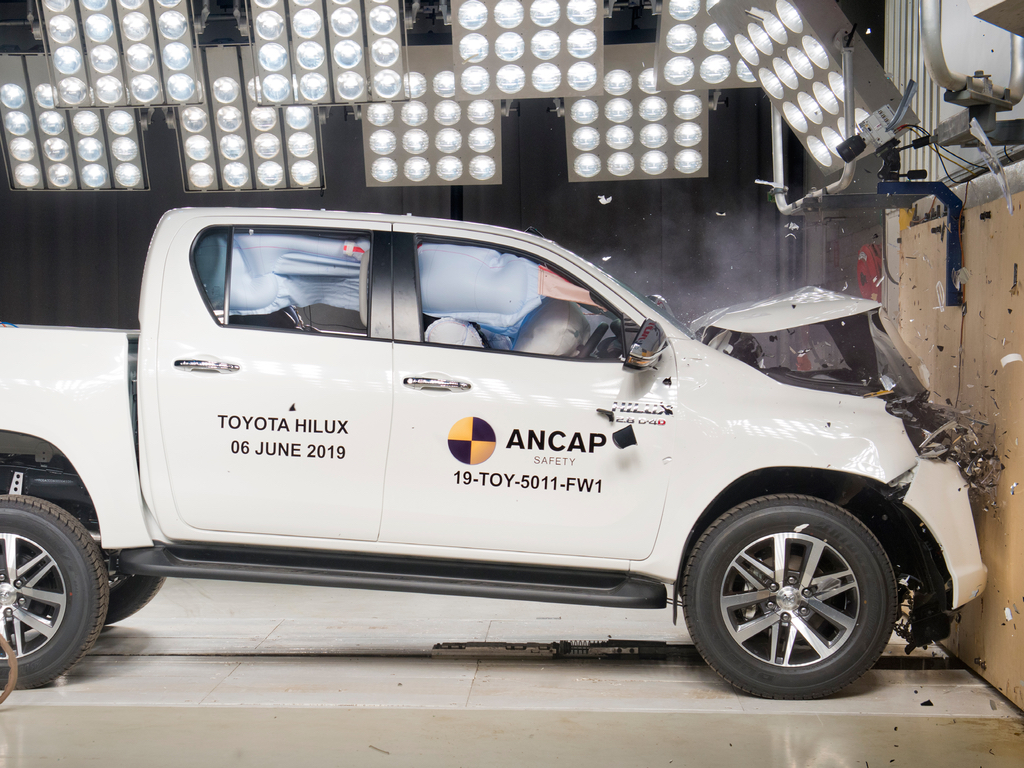
| Category | Toyota HiLux |
|---|---|
| Adult occupant protection | 96 per cent |
| Child occupant protection | 87 per cent |
| Vulnerable road user protection | 88 per cent |
| Safety assist | 78 per cent |
Standard safety features include:
- Autonomous emergency braking
- Pedestrian (day/night) detection
- Cyclist (day) detection
- High-speed adaptive cruise control
- Lane departure warning
- Brake-based lane assist
- Traffic sign recognition
HiLux Workmate 4×2 dual-cab pickup adds:
- Reversing camera
- Front and rear parking sensors
HiLux SR5 adds:
- Blind-spot monitoring
- Rear cross-traffic alert
- Surround-view camera
All HiLux variants also come with three years of complimentary access to Toyota Connected Services. Functions include SOS emergency call, automatic collision notification, stolen vehicle tracking, and other functions via the myToyota Connect phone app.
If you want to see how the Toyota HiLux lines up against the competition, check out our comparison tool
How much does the Toyota HiLux cost to run?
The Toyota HiLux is covered by a five-year, unlimited-kilometre warranty like the wider Toyota Australia lineup. If you get scheduled servicing done at an official Toyota dealer, the driveline warranty can be extended to seven years as long as the vehicle isn’t used for commercial purposes.
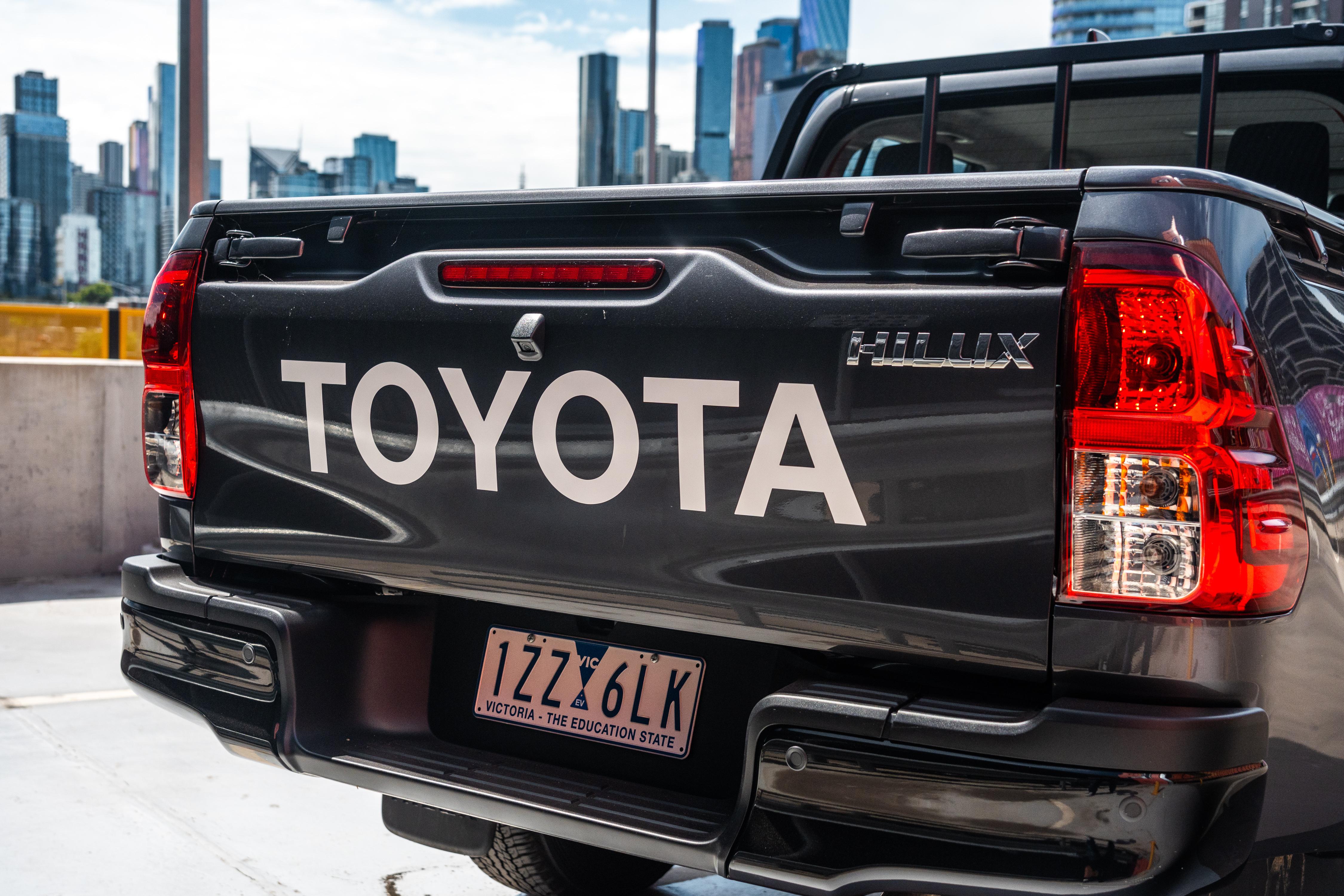
| Servicing and Warranty | Toyota HiLux SR V-Active |
|---|---|
| Warranty | 5 years, unlimited kilometres – standard |
| Roadside assistance | $99 per year |
| Service intervals | 6 months or 10,000km |
| Capped-price servicing | 3 years |
| Average annual service cost | $610 |
| Total capped-price service cost | $1830 |
If you want to see how the Toyota HiLux lines up against the competition, check out our comparison tool
CarExpert’s Take on the Toyota HiLux SR V-Active
Now isn’t the right time to buy a Toyota HiLux, especially in SR V-Active form.
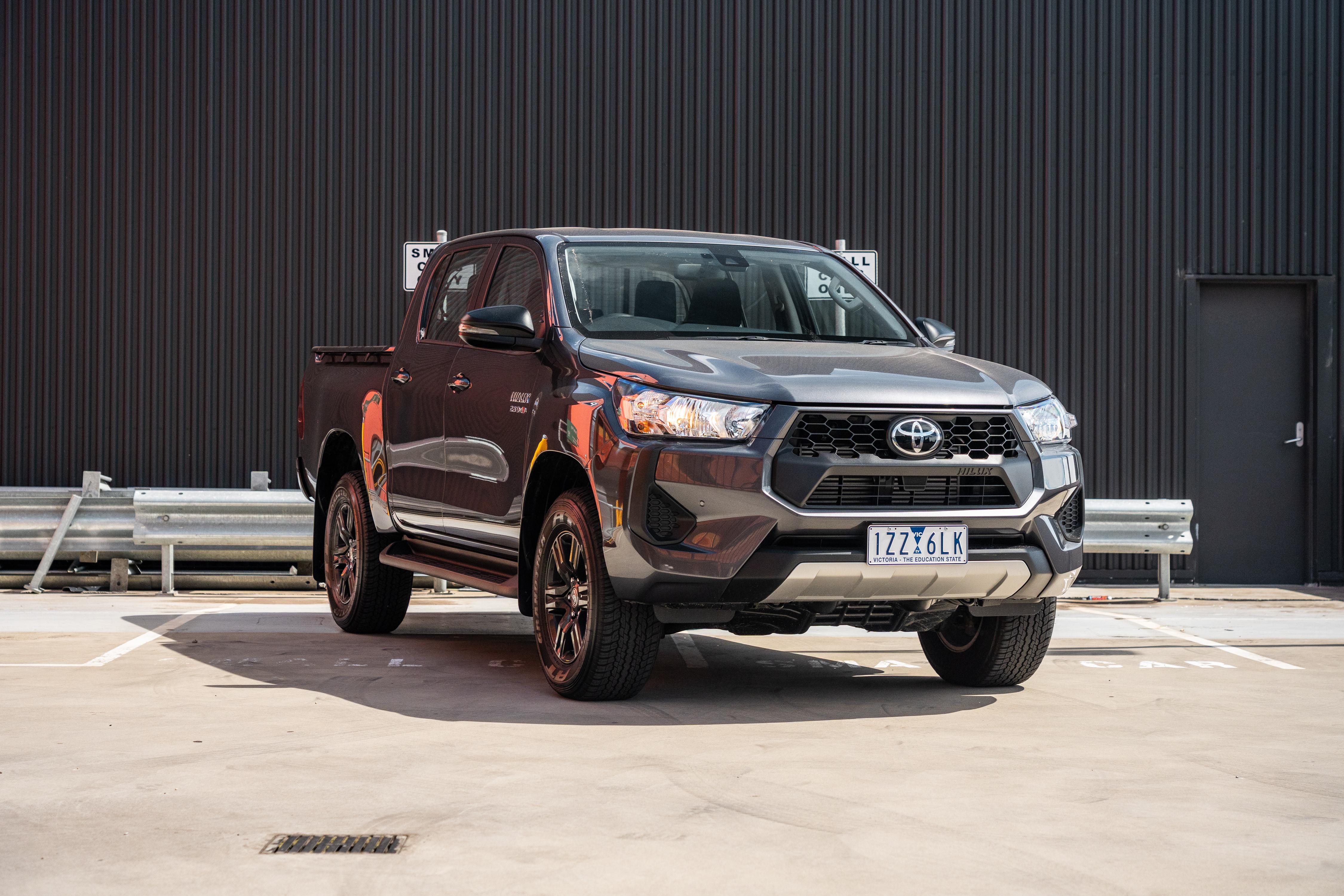
The ninth-generation HiLux is set to be unveiled imminently, with deliveries set to kick off next year. While that’s not always a valid reason to ignore a current model, it is for Toyota’s iconic pickup.
That’s because the HiLux no longer stands out in one of the world’s most competitive ute markets. Aside from proven reliability and a trusted badge, it just doesn’t excel in any particular area.
The Ford Ranger is now a clear segment leader, while the box-fresh Kia Tasman also makes the HiLux feel old-school for the wrong reasons.
Alternatives at the cheaper end of the market have also improved dramatically in recent years. Top versions of the GWM Cannon and KGM Musso represent better value than this mid-spec HiLux, while the BYD Shark 6 makes more sense for the modern lifestyle ute buyer.
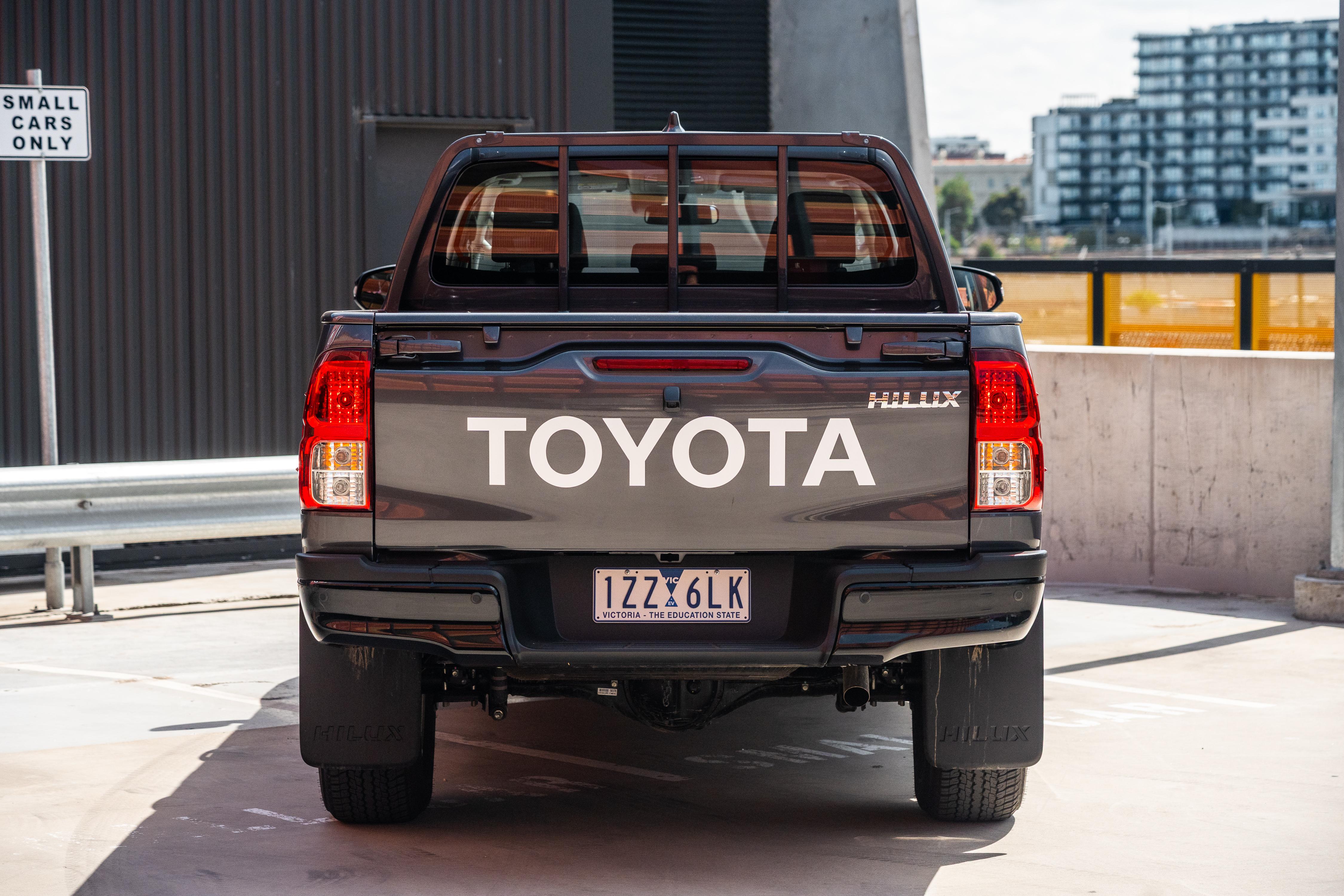
CarExpert can save you thousands on a new Toyota HiLux. Click here to get a great deal
Click the images for the full gallery

